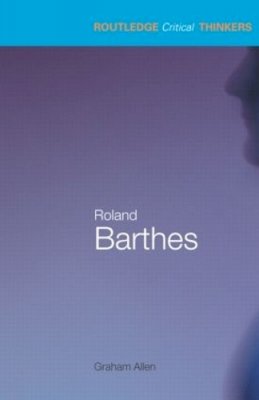
Stock image for illustration purposes only - book cover, edition or condition may vary.
Roland Barthes
Graham Allen
€ 26.99
€ 26.57
FREE Delivery in Ireland
Description for Roland Barthes
Paperback. Roland Barthes is a central figure in the study of language, literature, culture and the media. This title prepares readers for their first encounter with his crucial writings on some of the most important theoretical debates. Tracing his engagement with other key thinkers, it offers a clear picture of Barthes' work in-context. Series: Routledge Critical Thinkers. Num Pages: 192 pages, bibliography, further reading. BIC Classification: DSA. Category: (G) General (US: Trade); (P) Professional & Vocational; (U) Tertiary Education (US: College). Dimension: 198 x 130 x 14. Weight in Grams: 198.
Roland Barthes is a central figure in the study of language, literature, culture and the media. This book prepares readers for their first encounter with his crucial writings on some of the most important theoretical debates, including: *existentialism and Marxism *semiology, or the 'language of signs' *structuralism and narrative analysis *post-structuralism, deconstruction and 'the death of the author' *theories of the text and intertextuality. Tracing his engagement with other key thinkers such as Sartre, Saussure, Derrida and Kristeva, this volume offers a clear picture of Barthes work in-context. The in-depth understanding of Barthes offered by this guide is essential to ... Read more
Roland Barthes is a central figure in the study of language, literature, culture and the media. This book prepares readers for their first encounter with his crucial writings on some of the most important theoretical debates, including: *existentialism and Marxism *semiology, or the 'language of signs' *structuralism and narrative analysis *post-structuralism, deconstruction and 'the death of the author' *theories of the text and intertextuality. Tracing his engagement with other key thinkers such as Sartre, Saussure, Derrida and Kristeva, this volume offers a clear picture of Barthes work in-context. The in-depth understanding of Barthes offered by this guide is essential to ... Read more
Product Details
Publisher
Taylor & Francis Ltd United Kingdom
Number of pages
192
Format
Paperback
Publication date
2003
Series
Routledge Critical Thinkers
Condition
New
Weight
197g
Number of Pages
192
Place of Publication
London, United Kingdom
ISBN
9780415263627
SKU
V9780415263627
Shipping Time
Usually ships in 4 to 8 working days
Ref
99-1
About Graham Allen
Graham Allen is a lecturer in English at University College, Cork. He is the author of Intertextuality in Routledge's New Critical Idiom series and has published widely in literary theory and in the literature of the Romantic period.
Reviews for Roland Barthes
'These little books are certainly helpful study guides. They are clear, concise and complete. They are ideal for undergraduates studying for exams or writing essays and for lifelong learners wanting to expand their knowledge of a given author or idea.' - Beth Lord, Times Higher Education Supplement
